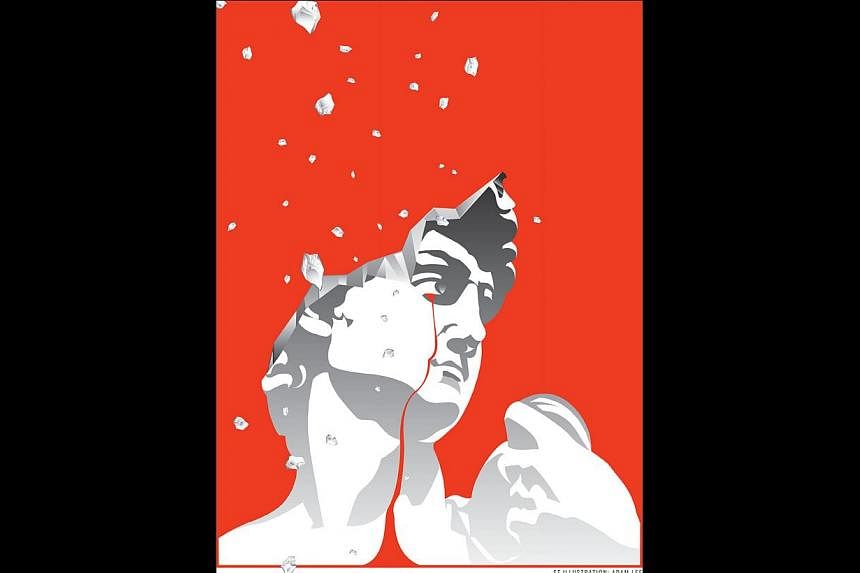During the days when I was an academic working in Berlin, Germany, I had the rare privilege of being able to take a leisurely stroll downtown to the Pergamon Museum, where, among other things, the great Pergamon altar and the Ishtar gates of Babylon were on permanent display.
Though I had seen them many times, they never failed to amaze me and were a reminder of the great feats of artistry and innovation that the ancients were capable of; proof, if any was needed, of humanity's great civilisational genius and the fact that true genius can outlive the rise and fall of empires and the devastating onslaught of time. I had, since then, harboured the longing to see the places where these monuments and artefacts were first encountered and collected - though it seems that that desire to connect with the past now has to be crossed off my bucket list.
For it has come to light that the ancient city of Nimrud has been bulldozed into oblivion by the radical militant group calling itself the Islamic State in Iraq and Syria (ISIS), and with that one act of vandalism, much of the legacy of the Assyrian kingdom of old has been pummelled into extinction.
That ISIS is willing and able to destroy the very historical foundations of its own people and culture is, sadly, neither novel nor unique: The Spanish conquistadors eradicated the ancient culture of the Mayans and Aztecs by melting their golden artefacts into gold bars to be brought to Spain to fill the coffers of their own kingdom - enriching themselves while impoverishing another civilisation at the same time.
A more recent example can be found closer to home, when the Khmer Rouge systematically destroyed temples and decapitated statues all over the Cambodian countryside in order to erase its past, while at the same time engaging in a dirty though lucrative trade of statue heads with antique dealers and collectors across the world, trading history for dirty money to buy bullets and landmines.
During the Afghan conflict, both the mujahideen and later the Taleban did the same, erasing their pre-modern history in the name of piety, while also making some money on the side by selling off Central Asian antiquities to those who had the cash to pay for them.
That vandalism is part of war is as old as war itself, and was something practised by everyone from the Mongols who sacked and burned the libraries of Baghdad to the Nazis who robbed museums across Europe. What is specific about ISIS' brand of vandalism, however, is that it was justified and motivated by a simpler longing for a simpler past, one that is unencumbered by traces of complexity and pluralism which the group so evidently loathes.
Military historians may recount tales of how one invading power destroyed or robbed the culture and history of another; either to erase the past of the defeated nation or to steal its cultural capital in order to reappropriate it and relocate it in the museum of Empire instead.
But what is happening in Syria at present is something entirely different, for it is an attack on the culture, history and civilisation of a nation that is coming from members of that nation themselves. This is not an instance of wanton destruction on the part of hoodlums with a proclivity to swing hammers around, but something that is much more sinister and worrisome in its implications.
Search for a simple past
ISIS is not the first radical group to claim some sense of moral purpose in its systematic destruction of its own history: The Taleban did the same when it blew up the colossal statues of Bamiyan, much to the consternation of academics and historians the world over, and despite the appeals by Muslim scholars from other Muslim countries too.
Like the Taleban, the adherents of ISIS' ideology believe that the confusion and anxiety that defines their present condition is partly the result of their complex history that gave birth to the complexities of today. Sites such as the city of Nimrud and the ruins of Babylon are proof of a time when there existed other, earlier civilisations and kingdoms that were not only great in terms of their military prowess, but also their cultural achievements. While some nations take pride in the accomplishments of their ancestors - Indonesia, for instance, never tires of waxing eloquent about the glories of Borobudur and Prambanan in Java - others find the past too complex, too plural and too contingent to deal with.
It is this longing for a simple past that drives the likes of ISIS and the Taleban to do what they do: The destruction at Nimrud, like in Bamiyan - was a case of literally sweeping away historical counter-factuals and alternative realities with a single violent stroke. For the adherents of such movements, their simple message with its simple solution can be delivered only in a simplified setting where no alternative world views and thought systems exist.
ISIS' longing to create a simpler-than-simple realm, where only one people of one faith community who hold to one culture and abide by one monological worldview, can be realised only once all other alternatives are removed from the equation. Simply put: For ISIS' simple vision of a homogenous paradise to be realised, the complex and plural past of Syrian and Iraqi society needs to be erased and forgotten, for ever.
Erasing complexity
HISTORIANS, however, will note that such a simplistic view of history and society seldom holds: While the artefacts and monuments of Nimrud point to the complex past of Syria when it was once a plural and dynamic civilisation, it is not the monuments and artefacts that made ancient Syria such a complex and interesting place. Rather, the reverse is true: It was precisely because ancient Syria was such a complex and dynamic society - a melting pot of cultures, ethnicities, belief systems and languages - that its art and culture were so refined and complex.
These monuments and artefacts point to a past when the Arab lands were at the crossroads of great cultures and nations, and when Arab civilisation had grown sophisticated and cosmopolitan thanks to its openness and its interaction with the East and West. They remain as silent testaments of a time when the Arab lands were plural, fluid and hybrid, and when Arab-Assyrian culture could not be reduced to simplified essentials.
But it is precisely such a complex and interesting past that befuddles and frustrates the attempts by monological ideologues who entertain the belief that the complex realities of today's world can be addressed and overcome by the destruction of all traces of contingency and difference. The net result of this pitiful destruction is that Syrian society - and the world by extension - has now lost another anchor to our complex inter-connected past.
Groups like ISIS may wish to deny history and erase all traces of complexity for their simple view of society to predominate and eventually become true. But simple solutions are often the worst solutions, and as soon as such movements walk down that path of over-simplification, further antagonism is bound to arise: The Soviets who erased the history of Czarist Russia eventually hunted down their own ideologues and historians who were "not Soviet" enough; the Khmer Rouge purged its own; as did the Fascists too.
If ISIS' leaders seriously believe that a denial of their past will lead to a pure and pristine present, then they are mistaken - as we have seen thanks to the internal purges and killings among themselves now. Life is complex and the value of history is that it reminds us that our complexity today merely follows on from the complexity of the past, no matter how uncomfortable some may be with that past.
Orientalism come true
THESE developments remind me of the times that I visited the museums of Europe, where I marvelled at the great cultural achievements of other non-European cultures. The Pergamon Museum, which is home to some of the greatest works of Assyria, was criticised in the 1960s as an Orientalist relic, a hangover from the colonial era. Time and again, many postcolonial states have demanded that the relics and artefacts of their countries be returned to them.
Yet, during the colonial era, many of these relics and artefacts were taken from the East precisely because they had been neglected or were no longer valued by their own societies. Unpalatable though it may sound to those of us born in the age of political-correctness, it has to be admitted that the Assyrian relics in the museums of Europe have been better taken care of, and are in much safer condition, than the relics that are still in Syria and now at the mercy of club-wielding ISIS followers who have no issues with crushing their own past to smithereens for the sake of making a short video clip.
This is a cautionary tale for all of us today, living as we do in a complex world beset by a wide range of challenges: The erasure of history and the denial of our complex past does not, cannot, and will not prepare us for the realities of the complex present.
And should it come to pass that other postcolonial societies go down the same path and take the hammer to their own culture and civilisational accomplishments, they would in fact be doing precisely what the Orientalists of the colonial era had said they would do: Destroy their past and their future in a pathetic bid to escape the realities of the present and, by extension, confirm the stereotypical view that some nations are unable to value and protect their own history, and are thus unworthy of it.
The writer is associate professor at the S. Rajaratnam School of International Studies, Nanyang Technological University.


